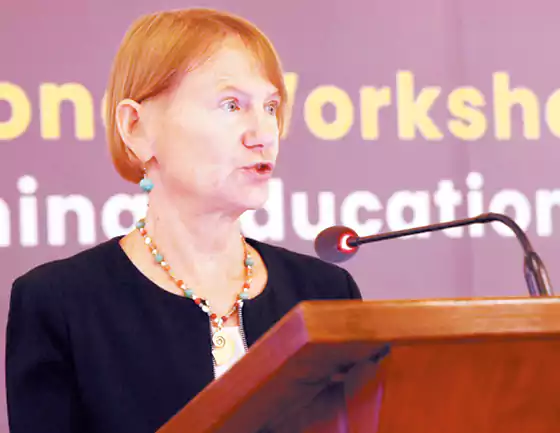Zubair Qureshi
Participants at a national education workshop have called upon education actors in Pakistan to work together to scale up Accelerated Learning Programmes (ALPs) to provide education for disadvantaged, over-age, out-of-school children and youth, who missed out on or had their education interrupted.
Jointly organized by the UNHCR, the UN Refugee Agency and Japan International Cooperation Agency (JICA), the workshop dedicated to accelerated learning was attended by over 80 participants including government officials and education actors from Punjab, Sindh, Balochistan and Khyber Pakhtunkhwa (KP). Discussions focused on best practices, as well as opportunities for better coordination and collaboration to address the huge education needs in Pakistan.
Speaking at the occasion, Ms. Philippa Candler, UNHCR’s Representative appreciated the Government of Pakistan for its continued support to refugees and to refugee education.
“It is alarming that over 250 million children are out of schools across the world, and 26 million of these are from Pakistan, among them 500,000 refugee children,” she added.
She added that programmes such as the ALP are an essential component in supporting out of school refugee adolescents and youth to access and complete primary education and transition to secondary education, especially girls and young women.
Ms. Candler underlined the need for collective efforts and find solutions to improve situation of education in Pakistan for all, and reaffirmed UNHCR’s commitment to support the development of policies and programmes that benefit both refugee and host communities’ children.
Mr. Naoaki Miyata, Country Chief of JICA said that Pakistan stands at a critical juncture where 67 percent of its population is under the age of 30.
He added that JICA has been focusing on human capital development through enhancing access to quality education and this conference will pave the ways for advocating impactful measures through accelerated education policy in Pakistan to address the out-of-school challenges.
Speaking at the occasion, Sohail Akhtar Malik, Senior Joint Secretary at the Ministry of Federal Education and Professional Training, highlighted the urgency of the situation, including the declaration by Pakistan’s Prime Minister of an education emergency, and underscored the need for adopting innovative, cost-effective solutions and approaches to provide right to education to out-of-school children especially through digital technology, namely through the acceleration learning programme.
During the workshop, participants also shared good practices and efforts underway to address the education crisis, including Allama Iqbal Open University delivering ALP (Middle-Tech) to around 3,000 children across the country.
The provincial level consultations will now get underway, followed by national technical level discussions in September with a goal to agree on a unified approach to accelerated education, ensuring these programmes are accredited and effectively support children in need, regardless of their status.










